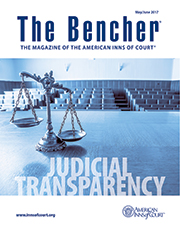Delaware Imposes Penalties for Litigation Misconduct
The Bencher—May/June 2017
By Francis G.X. Pileggi, Esquire

 The Delaware Supreme Court recently upheld a decision of the Delaware Court of Chancery imposing a penalty of more than $7 million in legal fees incurred by the opposing party in connection with a business dispute between two co-owners of a successful company. The fee-shifting was based on a finding of litigation misconduct. This opinion serves as a useful reminder for all litigants that at least in one state failure of the parties to comply with important standards of litigation conduct will be met with serious penalties.
The Delaware Supreme Court recently upheld a decision of the Delaware Court of Chancery imposing a penalty of more than $7 million in legal fees incurred by the opposing party in connection with a business dispute between two co-owners of a successful company. The fee-shifting was based on a finding of litigation misconduct. This opinion serves as a useful reminder for all litigants that at least in one state failure of the parties to comply with important standards of litigation conduct will be met with serious penalties.
The formal written opinions on various aspects of this case by the Court of Chancery and Supreme Court combined exceed 200-pages, along with footnotes of a greater number. This article highlights the decision regarding actions that supported the fee shifting as a penalty. In connection with the hotly contested, complex litigation, both parties claimed breaches of fiduciary duty, and sought the court’s help to break a deadlock among the co-owners of a company that generated annual revenue of over $500 million. The court found after an evidentiary hearing that one of the parties: (1) deleted documents from his laptop, even after litigation-hold notices were circulated, and after an order from the court requiring the production of the laptop; (2) recklessly failed to safeguard information on a cell phone; (3) improperly gained access to the emails of another party in the litigation; and (4) lied multiple times in response to discovery requests and in a deposition.
The court reasoned that the improper conduct impeded the administration of justice, unduly complicated the proceedings, and caused the court to make false factual findings. The court ordered the person engaging in the misdeeds to pay 100% of the fees incurred in connection with the motion for sanctions and 33% of the fees incurred in litigating the merits of the case, which resulted in an award of over $7 million in fees and expenses.
In upholding that civil penalty, the Delaware Supreme Court described the errant conduct in detail. For example, a Party’s cell phone with relevant data was allegedly “dropped in a plastic cup of Diet Coke.” Although the company involved in the stockholder dispute was in the business of providing forensic services to preserve and retrieve electronic data, the party involved merely asked an assistant with no expertise in forensics, to attempt to dry-out the phone. After that meager effort was unsuccessful, instead of having an expert attempt to retrieve the data from the phone, the phone was discarded. The Court of Chancery found that explanation unbelievable and so did the Supreme Court.
In addition, the party penalized had deleted approximately 20,000 emails the day before making an image of data on his laptop. He also emptied the recycle bin on his laptop that was used to delete the emails. Notably, his recycle bin was not emptied on a regular basis prior to this deletion. Browser history and files created by application software were also deleted. Subsequent forensic examination revealed that shadow copies were routinely created by the operating system, unbeknownst to the person who deleted the emails. As a result, the vast majority of them were recovered.
The court found that the intentional destruction of information after the court had entered an order requiring the production of that information, and recklessly failing to safeguard evidence on the cell phone which was regularly used to exchange text messages, made an important source of discovery unavailable. Together with repeatedly lying to conceal aspects of the deletion of information, these actions constituted bad faith.
Importantly, there is no requirement that a person who deletes discoverable information succeed in his efforts to thwart the ability of an opposing party to prosecute the merits of the case. Penalties can be imposed for bad faith tactics even if those tactics are not successful in thwarting litigation, or delaying it, or making it unnecessarily complicated.
This decision on penalties is useful as a reference tool for litigators who seek to incentivize both their clients and opposing parties to play by the rules, especially if they hope to avoid expensive penalties for noncompliance. See Shawe v. Elting, Del. Supr., No. 487, 2016 (Feb. 13, 2017).
Francis G.X. Pileggi, Esquire, is the member-in-charge of the Wilmington, Delaware, office of Eckert Seamans Cherin & Mellott, LLC. He summarizes key corporate and commercial decisions of Delaware Courts, and addresses legal ethics, at www.delawarelitigation.com.
© 2017 Francis G.X. Pileggi, Esq. This article was originally published in the May/June 2017 issue of The Bencher, a bi-monthly publication of the American Inns of Court. This article,
in full or in part, may not be copied, reprinted, distributed, or stored
electronically in any form without the express written consent of the American Inns of Court.